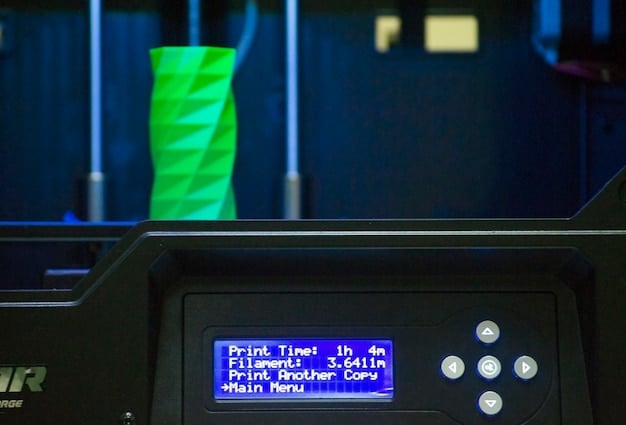FDA Updates & Biotech Jobs: Navigating New Regulations in the US

Recent updates to FDA regulations significantly impact biotech manufacturing jobs in the US, requiring professionals to adapt to new compliance standards and technological advancements.
Staying ahead in the dynamic field of biotechnology requires constant awareness of regulatory changes. Recent updates: New FDA regulations and their impact on biotech manufacturing jobs in the US are creating both challenges and opportunities for professionals in this sector.
Understanding the FDA’s Role in Biotech Manufacturing
The Food and Drug Administration (FDA) plays a crucial role in ensuring the safety and efficacy of drugs, biologics, and medical devices. Its regulations directly impact biotech manufacturing, dictating standards for production, quality control, and compliance. Changes to these regulations can have profound effects on the industry.
The FDA’s oversight extends to every stage of the manufacturing process, from raw materials to finished products. Compliance with current Good Manufacturing Practices (cGMP) is essential for biotech companies to operate in the US market. Understanding the FDA’s evolving requirements is therefore paramount for job security and career advancement in biotech manufacturing.
Key Areas of FDA Regulation for Biotech Manufacturing
Several areas are particularly important for biotech professionals to understand regarding FDA regulations. These areas directly affect manufacturing processes, quality control, and overall compliance.
- cGMP Compliance: Ensures products are consistently produced and controlled according to quality standards.
- Validation Processes: Confirms that manufacturing processes consistently produce expected results.
- Data Integrity: Guarantees the reliability and accuracy of data used in decision-making and regulatory submissions.
Staying current with these areas is essential for maintaining compliance and ensuring product safety.
In conclusion, the FDA’s role in biotech manufacturing is critical for ensuring the safety and efficacy of products. Biotech professionals must understand and adhere to these regulations to maintain compliance and protect public health.

Recent Changes to FDA Regulations: An Overview
Recent years have seen significant updates to FDA regulations, driven by advancements in technology, evolving scientific understanding, and the need to address emerging public health challenges. These changes are reshaping biotech manufacturing processes and workforce requirements.
These regulatory updates often aim to enhance safety, improve product quality, and streamline approval pathways. As a result, biotech manufacturers must adapt their operations to meet these new standards. These adaptations include updating equipment, refining processes, and retraining personnel.
Specific Updates in FDA Regulations
Several specific aspects of FDA regulations have seen recent updates. It’s important to be aware of them. These changes are influencing the strategies and operations of biotech manufacturers across the US.
- Increased Emphasis on Data Security: Protecting sensitive data from cyber threats and ensuring data integrity.
- Advanced Manufacturing Technologies: Incorporating technologies like 3D printing and continuous manufacturing.
- Real-World Evidence (RWE): Utilizing patient data collected outside of traditional clinical trials to support regulatory decisions.
Implementing these changes requires significant investment in training and infrastructure.
In summary, recent changes to FDA regulations reflect the agency’s commitment to safety, innovation, and public health. Biotech manufacturers need to stay informed about these changes and proactively adapt their operations.
Impact on Biotech Manufacturing Jobs
The updates to FDA regulations have a direct impact on the types of jobs needed and the skills required in biotech manufacturing. As companies adapt to new compliance standards and technologies, the demand for specific roles and expertise is shifting.
This evolving landscape presents both challenges and opportunities for biotech professionals. Those who proactively acquire new skills and knowledge will be best positioned to thrive in this changing environment. Individuals with expertise in regulatory compliance, data analytics, and advanced manufacturing are particularly in demand.
Specific Job Roles Affected
Several job roles within biotech manufacturing are being significantly affected by the regulatory updates. Understanding these shifts can help individuals target their career development efforts.
- Manufacturing Engineers: Implementing and optimizing new manufacturing processes.
- Regulatory Affairs Specialists: Ensuring compliance with evolving FDA regulations.
- Quality Control Analysts: Monitoring and ensuring product quality in accordance with regulatory standards.
Preparing for these shifting demands can help ensure a stable and rewarding career in biotech manufacturing.

In conclusion, the impact of FDA regulatory updates on biotech manufacturing jobs is significant. The demand for skilled professionals in areas such as regulatory compliance, advanced manufacturing, and data analytics is growing, creating new opportunities for those who are prepared.
New Skills and Training Requirements
To meet the demands of the updated FDA regulations, biotech manufacturing professionals need to acquire new skills and undergo specialized training. Companies are investing in training programs to equip their workforce with the knowledge and abilities necessary for compliance and efficiency.
These training programs often focus on areas such as cGMP compliance, data integrity, advanced manufacturing technologies, and risk management. Individuals who proactively seek out these training opportunities will gain a competitive edge in the job market. Certification programs and continuing education courses are also valuable for demonstrating expertise.
Areas of Focus for New Skills
Several key areas demand focused attention when developing new skills to comply with updated FDA regulations. These areas are critical for maintaining compliance and improving operational efficiency.
- Data Analytics: Interpreting and utilizing data to improve manufacturing processes.
- Risk Management: Identifying and mitigating potential risks in manufacturing.
- Advanced Technologies: Operating and maintaining sophisticated manufacturing equipment.
Mastering these areas is crucial for success in modern biotech manufacturing.
In summary, new skills and training requirements are essential for biotech manufacturing professionals to comply with updated FDA regulations. Focusing on areas such as data analytics, risk management, and advanced technologies will improve job prospects and contribute to safer, more efficient manufacturing processes.
Preparing for the Future: Career Strategies
To thrive in the evolving biotech manufacturing landscape, professionals need to develop proactive career strategies. Staying informed about regulatory changes, acquiring new skills, and networking with industry experts are essential for long-term success.
Consider obtaining certifications that demonstrate expertise in specific areas of regulatory compliance or advanced manufacturing. Join professional organizations to network and stay updated on industry trends. Actively seek out opportunities to learn from experienced colleagues and mentors.
Key Career Strategies for Biotech Professionals
Several strategies can help biotech professionals navigate the challenges and opportunities presented by FDA regulatory updates. These strategies support career growth and ensure job security.
- Continuous Learning: Staying up-to-date with the latest regulations and technologies.
- Networking: Building relationships with industry experts and peers.
- Specialization: Developing expertise in a specific area of biotech manufacturing.
Implementing these strategies can significantly improve career prospects.
In conclusion, proactive career strategies are essential for biotech manufacturing professionals to thrive in the face of evolving FDA regulations. Continuous learning, networking, and specialization are key to navigating the changing landscape and achieving long-term success.
Resources for Staying Informed
Staying informed about FDA regulations and industry trends is crucial for biotech manufacturing professionals. Fortunately, numerous resources are available to help individuals stay up-to-date and informed.
The FDA website is the primary source of information on regulatory changes, guidance documents, and compliance requirements. Industry publications, such as BioProcess International and Genetic Engineering & Biotechnology News (GEN), provide insights into industry trends and best practices. Professional organizations like the Biotechnology Innovation Organization (BIO) offer valuable resources and networking opportunities.
Useful Resources for Biotech Professionals
Several specific resources are particularly useful for staying informed about FDA regulations and industry trends. Leveraging these resources can keep professionals ahead of the curve.
- FDA Website: The official source for regulatory information.
- Industry Publications: Providing insights into trends and best practices.
- Professional Organizations: Offering networking and educational opportunities.
Utilizing these resources can enhance knowledge and career prospects.
In summary, a variety of resources are available to help biotech manufacturing professionals stay informed about FDA regulations and industry trends. Leveraging these resources is essential for continuous learning, career advancement, and contributing to safer, more efficient manufacturing processes.
| Key Point | Brief Description |
|---|---|
| 🚨 FDA Regulatory Updates | Recent changes impact biotech manufacturing, focusing on safety and quality. |
| 💼 Job Market Shifts | Demand increases for roles in regulatory affairs, data analytics, and tech. |
| 📚 Training Imperative | New skills needed in GMP, data integrity, and advanced manufacturing. |
| 🌱 Career Growth | Continuous learning and networking are vital for career advancement. |
Frequently Asked Questions
▼
Recent regulations increase the demand for specialized skills in regulatory affairs, data analytics, quality control, and advanced technological expertise within biotech manufacturing jobs.
▼
Essential skills include a deep understanding of cGMP compliance, proficiency in data analytics for process optimization, and expertise in handling advanced technologies and manufacturing processes.
▼
The FDA website is the primary source, along with industry publications such as BioProcess International and Genetic Engineering & Biotechnology News (GEN), providing crucial updates.
▼
Continuous learning helps you stay updated with new technologies and regulatory requirements, enhancing your adaptability, and improving your prospects in the evolving biotech job market.
▼
Proactive career strategies include pursuing certifications, networking within the industry, and specializing in high-demand areas of biotech manufacturing and regulatory compliance.
Conclusion
Navigating the evolving landscape of FDA regulations is critical for biotech manufacturing professionals in the US. By staying informed, acquiring new skills, and developing proactive career strategies, individuals can thrive in this dynamic industry and contribute to safer, more efficient manufacturing processes.





